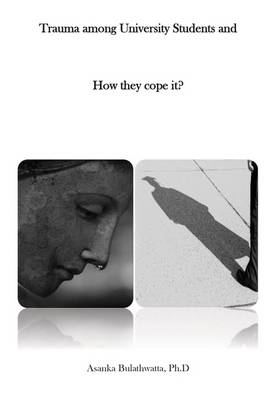
Trauma among University Students and How they cope it?
Shaker (Verlag)
978-3-8440-4945-9 (ISBN)
- Keine Verlagsinformationen verfügbar
- Artikel merken
Asanka Bulathwatta is a Sri Lankan Psychologist and PhD holder (Dr.) of the University of Leipzig. Professional Experience: Temporary Assistant Lecturer at the department of Philosophy and Psychology in the University of Peradeniya, Master of Work, Organizational and Personnel Psychology (Erasmus Mundus scholarship Programme by European Commission), scholarship holder of KAAD (Katholischer Akademischer Ausländer-Dienst). During 2012-2016 doctorate at the department of Educational and Rehabilitation Psychology, Institute of Psychology, University of Leipzig.
„Das junge Erwachsenenalter ist retrospektiv betrachtet für die meisten Menschen die glücklichste Zeit ihres Lebens gewesen. In der Echtzeit ihres Erlebens war diese Zeit aber für viele von ihnen geprägt durch extrem viele Entwicklungsaufgaben und traumatische Erlebnisse. Dabei mischt sich in diesen Komplex von lebenssituations-bezogenen Erfahrungen in dieser Lebensphase eine Kulturspezifik, die der Autor eindrucksvoll belegen kann. So sehen sich Universitätsstudenten aus Sri Lanka im ersten Studienjahr gewalttätigen Übergriffen älterer Studenten nach wie vor ausgesetzt, was als Initiierungsritual des „Ragging“ in Sri Lanka nach wie vor trotz Verbotes praktiziert wird.“
Prof. Dr. Evelin Witruk, University of Leipzig
“Dr Asanka Bulathwatta completed his Doctoral thesis at the Institute of Psychology, Faculty of BioSciences, Pharmacy and Psychology in the University of Leipzig. He is equipped with proper knowledge in the field of Educational and Rehabilitation Psychology with a special focus upon Trauma and Rehabilitation process of university students. This research work is relevant not only to the university population but also to the youth and adolescence who are overcoming traumatic experiences in their life. Moreover, the research has revealed important outcome figuring out cultural differences of coping styles during the rehabilitation process after traumatic experiences. Moreover, this work points out how they use their Emotional Intelligence and Resilience during this process. I firmly believe this work would be a great resource for the people who want to understand the facts, which can influence by Trauma and rehabilitation process. Especially the methodology and the sample came from a European Culture (Germany) and an Asian Culture (Sri Lanka) made the research project a cross-cultural validation.”
Prof. Dr. Konrad Reschke, University of Leipzig
| Erscheinungsdatum | 04.01.2017 |
|---|---|
| Reihe/Serie | Berichte aus der Psychologie |
| Verlagsort | Aachen |
| Sprache | englisch; deutsch |
| Maße | 148 x 210 mm |
| Gewicht | 207 g |
| Einbandart | geklebt |
| Themenwelt | Geisteswissenschaften ► Psychologie ► Pädagogische Psychologie |
| Geisteswissenschaften ► Psychologie ► Traumatherapie | |
| Medizin / Pharmazie ► Medizinische Fachgebiete ► Psychiatrie / Psychotherapie | |
| Schlagworte | Coping with Trauma • cross-cultural comparison • Emotional Intelligence • Resilience • Trauma • Trauma and disaster • Trauma and Psychotraumatology • University contextual trauma |
| ISBN-10 | 3-8440-4945-2 / 3844049452 |
| ISBN-13 | 978-3-8440-4945-9 / 9783844049459 |
| Zustand | Neuware |
| Haben Sie eine Frage zum Produkt? |
aus dem Bereich


